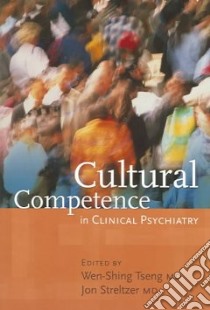Cultural Competence In Clinical Psychiatry - 9781585621255
Un libro in lingua di Wen Tseng Shing (EDT), Streltzer Jon M.D. (EDT) edito da Amer Psychiatric Pub Inc, 2004
- € 70.70
- Il prezzo è variabile in funzione del cambio della valuta d’origine
Building on their previous works about cultural competency in clinical areas and in psychotherapy, the editors have created in this volume an exceptional and entirely new approach to understanding and acquiring cultural competency. Instead of examining populations of different ethnic groups, particularly minority groups (as is typical in the literature), this illuminating volume examines cultural issues as applied to the practice of virtually every psychiatric service (e.g., inpatient, outpatient, consultation-liaison, pain management, and emergency) and specialty (e.g., child and adolescent, geriatric, addiction, and forensic psychiatry). Concluding chapters discuss cultural factors in psychopharmacology and psychotherapy. Thirteen distinguished contributors bring these issues to life with numerous case vignettes in all 11 chapters.
The foundation for this breakthrough approach rests on
- ? CultureThe unique behavior patterns and lifestyle that encompass a set of views, beliefs, values, and attitudes shared by a group of people that distinguish it from other groups. Culture and people influence each other reciprocally and interactionallyon a conscious or unconscious level.? Cultural competenceClinicians need to master cultural sensitivity, knowledge, and empathy; they need to be flexible, and they need to be skilled in culturally relevant doctor-patient relationships and interactions and to know how to use these elements therapeutically.? The critical importance of cultural competenceClinicians typically work in multiethnic-cultural societies, providing care for patients of diverse backgrounds. For this reason, virtually all clinical practice can be seen as transcultural. Even when clinicians treat patients who share cultural backgrounds similar to their own, it is inevitable that some differences exist.
Further, in the medical setting, three types of culture are present: the culture of the patient, the culture of the physician, and the medical culture in which the clinical work is practiced. Understanding these three cultural dimensions is essential to comprehending and carrying out culturally competent clinical work.
This practical and innovative guidedesigned to help mental health care professionals meet the new requirements for cultural competence in clinical workwill find a welcoming audience among students, residents, educators, and clinicians everywhere.
Informazioni bibliografiche
- Titolo del Libro in lingua: Cultural Competence In Clinical Psychiatry
- Lingua: English
- Autori : Wen Tseng Shing (EDT), Streltzer Jon M.D. (EDT)
- Editore: Amer Psychiatric Pub Inc
- Collana: Amer Psychiatric Pub Inc (Paperback)
- Data di Pubblicazione: 01 Agosto '04
- Genere: MEDICAL
- Argomenti : Cultural psychiatry Psychiatry methods Clinical Competence
- Pagine: 202
- Dimensioni mm: 234 x 152 x 19
- ISBN-10: 1585621250
- EAN-13: 9781585621255


